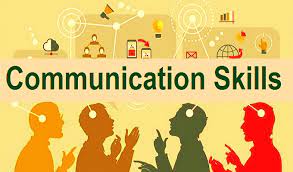10 Simple Yet Powerful Ways to Improve Your Communication Skills
We are constantly judged by how well we communicate our ideas, especially our communication skills.
Communication, especially writing, is essential to good communication at work.
Writing effectively means your messages have the right length, tone, and sentiment. When you write, you want to be as long as necessary and as short as possible.
However, we often send out emails in a rush, don’t review them, or rethink our approach. That reduces the effectiveness of our written communications.

Here are 10 simple yet powerful ways to improve your communication skills in your professionally and personal life.
1. Have a Purpose
What do you want your reader to do, and why should they do it? It would be best if you had a purpose for your writing. It would be best if you think before you write.
You must write with a purpose in mind. Ask yourself questions such as:
- What are your top three key messages?
- How can you communicate those messages effectively?
- How will your audience receive your messages?
Effective writing is about making sure you are clear and obvious. Write an introduction, body, and conclusion. Your most important messages should be in the middle.
2. Simplicity is Key
Some communication can be unnecessarily complex. Make sure you maximize every word you write. Simplify your words because clarity is the foundation for effective communication.
Don’t make your audience work because you use jargon, buzzwords, and industry acronyms. Don’t let your readers scratch their heads after reading your written communications. You don’t need fancy words or poetic sentences to seem wise.
To keep messages simple, use bullet points, highlight keywords or phrases, and divide up long sentences and paragraphs. Delete adjectives and adverbs and cut transitions that don’t add value.
Make sure each sentence you write has one thought. Construct each sentence with short words. For example, write use instead of utilize; help instead of facilitate; start instead of commence. The best writing is simple writing.
3. Use Specific Words and Phrases
Details matter because good writers know when to be specific. For example, be specific when naming people, describing action items, and deadlines.
The value of writing depends on the quality of the details. To be a better writer, paint a picture in the reader’s mind. Specific words provide a purpose. They produce clarity. They lay out a story through imagery.
Be precise with your words in your written communications. Avoid filler words and phrases such as basically, honestly, actually, seriously, and at the end of the day. Use bold adjectives such as brave, daring, and courageous in your story.
4. Organize Your Thoughts
Is your message easy to follow? Write an outline before you write an entire email or article. Figure out your main points and subpoints of those main points. This will help you organize your thoughts.
To organize your thoughts better, create a headline for each paragraph. Also, determine your call to action. What do you want to get the reader to do? For example, you want them to do X by Y.
5. Use an Active Voice
Use active voice in your writing to communicate who’s doing the action.
Here are some examples of active voice vs. passive voice:
- Jill moderated the meeting (active voice)
- The meeting was moderated by Jill (passive voice)
- The dog bit the man (active voice)
- The man was bitten by the dog (passive voice)
Active voice lets the reader know immediately who’s doing the action. It is stronger and preferable. Action-oriented language is stronger and clearer.
Active voice gets the reader to do something. Minimize passive language to add more power and intention to your written words.
6. Tell Good Stories
A great and memorable story can help you tremendously with your written communications. Stories are how we communicate. Think about how we love to tell stories around the campfire.
When you tell stories, talk about your personal experience. Identify a central message and build the story around that message. Remember, details matter, and embrace conflict (good vs. evil) to help you tell a better story.
7. Keep Communication Short
Research has found that sentences with eight or fewer words are understood 100% of the time. Use short sentences, short words, and short paragraphs when communicating via the written word.
Be concise. Ensure the reader doesn’t think your written communications are “too long; didn’t read” or the abbreviation “TL; DR.” When you are long-winded with your communication, you don’t know the topic well enough, you come across as unorganized, and you’ll lose your readers’ attention.
When writing, consider the 3 Cs: concise, compelling, and clear. Don’t cover too much ground; each written communication should have one takeaway. Hone in on your message, eliminate extraneous material, and get to the point.
8. Put Yourself in the Audience Shoes
Communication only resonates when your readers understand it. The message you are communicating is not about you; it’s about your reader.
Consider the wants and needs of your reader and adjust your communication. Think about their perspective.
- What background information do they have on the topic?
- What additional information or context will they need?
- What details will they need to communicate a complete picture?
Pretend you are the reader of your communication. Make it easier for them to understand, digest, and internalize.
9. Edit
Excellent writing requires a good amount of editing. Re-read what you have written many times. Each time, focus on the different parts of your message. The organization. The grammar. The word choices.
Editing eliminates words, phrases, and paragraphs that don’t add value. When writing effectively, you can’t edit too much. Use tools like Grammarly and Hemmingway Editor to edit your written communications.
It’s crucial to ensure your key messages are clear and concise. When you are editing, read your writing out loud. Hear how it sounds. Editing is a critical part of the writing process.
10. Proofread
Did you ever send an email or written communication with typos and grammar mistakes? It happens, but you must make it the exception, not the norm. It’s critical to proofread your writing.
Proofreading will strengthen your ability to communicate. Enlist an editor for a fresh second eye. Protect yourself from writing mishaps with proofreading.
Proofreading can catch little things like “pubic” when you meant “public.” Noticing these little embarrassments before they go out can help you improve your communication skills.
Bringing It All Together
There are 10 simple yet powerful ways to improve your communication skills. Have a purpose; simplicity is essential, and use specific words and phrases. Furthermore, organize your thoughts, use an active voice, tell good stories, keep communications short, put yourself in the reader’s shoes, edit, and proofread.
If you follow these tips, you can clearly and concisely communicate with your writing. Remember that writing can help you clarify your thoughts, and clear thinking can help you improve your writing. They are intertwined.
Good communicators are not born; they are made.
They work hard to communicate better. Write daily, learn how to become a better writer, and the writing will become easier and more enjoyable.
Communicating effectively will help you connect better with others, enhance your relationships, and build trust. The more you practice writing, the more confident you’ll become with this communication channel.



